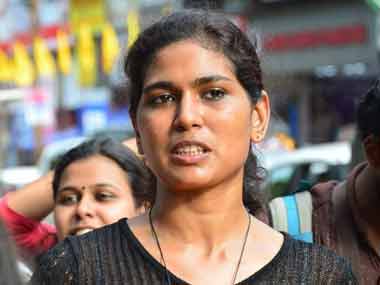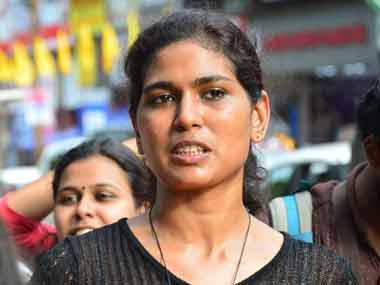On Saturday, the Kerala Jamaat took the rather unexpected decision to expel activist Rehana Fathima from the community. Not just her, but her family too. You may think this is an unpopular decision, but judging by reactions on social media, most people in Kerala, cutting across religious and party lines, welcomed it. Malayalees are deeply embarrassed by how Rehana, accompanied by a journalist from Andhra Pradesh, came within striking distance of climbing up the sacred 18 steps to the temple of Ayyappa. [caption id=“attachment_5425351” align=“alignleft” width=“380”]  Rehana Fathima. Image courtesy Rehana Fathima’s Facebook profile[/caption] On a day of high drama, public anger against the state government was mounting as an inspector general of police and a phalanx of policemen accompanied the riot gear-clad women up the steep path that leads to the shrine. If TV reports were to be believed, the women would soon climb the 18 steps. But then, two things happened. First, Devaswom Minister Kadakampally Surendran appeared on TV and said that while the government would protect genuine devotees, it would not allow Sabarimala to be turned into a proving ground for activists. Shortly after, the temple priests, or thantris as they are called, announced they would stop poojas and close the temple doors if the women were allowed inside. Faced with this unprecedented defiance, the women were forced to return. In hindsight, it is pertinent to ask if the threat to close down the temple by the thantris was a unilateral one. The thantris are employees of the Devaswom Board, and their minister was on the spot directing operations. Was encouraging a revolt among the thantris a clever plan by the state government to thwart the women activists? Clearly, the Sabarimala fracas is something Kerala’s CPM government can do without. Although Kerala is a Communist-ruled state, its voters are not atheists. Temples, mosques, and churches profusely dot the landscape and it’s easy to see why this is called God’s Own Country. Sabarimala is a striking example of communal amity. And it goes back to the 12th century AD when Ayyappa was the prince of Panthalam. An Arab pirate named Vavar (Malayalam for Babar) terrorised the coastline of the area. Ayyappa confronted and defeated him after which Vavar became Ayyappa’s most loyal subject. When Ayyappa retreated to Sabarimala, Vavar wanted to accompany him. But Ayyappa instructed him to remain in Erumeli, at the entrance to the treacherous path to Sabarimala. Vavar’s job was to guard the path and protect devotees from being harmed by robbers and wild animals. Every year, millions of devotees first visit the Vavar mosque in Erumeli before going up the mountain. And, at the top, just across the courtyard in front of the temple, sits a small Muslim shrine. The mullah there distributes holy ash as prasad, perhaps the only Muslim shrine anywhere to do so. While Rehana’s adventurism has been seized upon by the extreme right as another example of how Muslims are attacking Hindu traditions, it appears to be far from the truth. Her Facebook page is an eclectic (some would say weird) mix of rants against the right, claims that she is an Ayyappa devotee, and pictures of her in bathing suits. She seems to be operating on her own, and, contrary to what her accusers may say, does not seem to be part of some grand conspiracy to attack Hindus. But, if she angered Hindus, she seems to have angered her own community even more. Excommunicating an adherent, along with her family, is a big step for the Jamaat to take, and some thought must have gone into it. This harsh decision is most probably due to Sabarimala’s extraordinary backstory involving the confluence of Hinduism and Islam. It’s a balance that the Hindus and Muslims of Kerala are equally proud of. Rehana’s attempts to enter the temple threatened that balance. Meanwhile, the state government is trying to distance itself from the controversy without actually seeming to be part of any decisions that will be seen as pandering to Hindu sentiment. If, as some believe, the threatened closure of the temple by the thantris had official approval, then it was indeed a masterstroke. So, while one arm of the government, meaning the police, appeared to be supporting the activists, another arm of the same government, meaning the priests, successfully thwarted their attempts. With the police going soft on the protestors, the state government was severely criticised for its inability to implement the Supreme Court order. To deflect attention from the state government’s perceived failure, CPM general secretary Sitaram Yechury compared the Sabarimala protests to the Babri demolition, blaming the RSS for it. This is rubbish. The protests were spontaneous to start with, but both the Congress and BJP quickly saw where the sentiment lay and took advantage of the situation. It’s a rare sight to see the BJP and Congress agree on something! Actually, it is the RSS that has flip-flopped on the issue. Back in 2016, it had come out strongly to support the entry of women in Sabarimala. But, barely two years later, its stand has changed. Clearly, if it comes to scoring brownie points against the CPM government, anything goes. But the Internet has the uncomfortable habit of raking up the past.
While Rehana Fathima’s adventurism has been seized upon by the extreme right as another example of how Muslims are attacking Hindu traditions, it appears to be far from the truth.
Advertisement
End of Article


)

)
)
)
)
)
)
)
)



